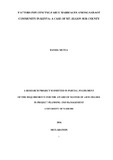| dc.description.abstract | The purpose of the study was to investigate factors influencing Early Marriages among Sabaot Community in Mt. Elgon Sub-County, Kenya. The objectives of the study were: To establish the extent to which Cultural practices influence early marriages among Sabaot Community in Mt. Elgon Sub-County, to determine how reproductive health practices influence early marriages among Sabaot Community in Mt. Elgon Sub-County, establish how education influence early marriages among Sabaot Community in Mt. Elgon Sub-County, and assess how status influence early marriages among Sabaot Community in Mt. Elgon Sub-County. The study adopted the Theory of Change postulated by Priscilla Lewis. The study employed a descriptive research design with target population of 4562 Households heads. A sample size of 156 was used derived from Miller & Brewer mathematical formula and data was gathered using questionnaires, interview schedules and Focus Group Discussions. Data analysis was done after editing and checking out that all questionnaires were filled in correctly. Data was analysed descriptively using Statistical Package for Social Sciences and the results presented in form of frequency tables and percentages. Results shows that gender inequality and beliefs in traditional cultural practices such as Female Genital Mutilation practices among Sabaot community significantly influenced early marriages. Teenage pregnancy and inadequate knowledge on of use contraceptives among Sabaot community significantly influenced early marriages due to pressure and fear of betrothal to older men for girls and forced marriage for boys usually end up seeking unsafe abortions from untrained people. Most of the respondents were primary certificate holders and therefore access to education. Statistics indicate that most of the households among the Sabaot community were not economically independent and there is high income inequality. The study recommends effective and transformative interventions that eliminate child marriage must span multiple sectors and include different approaches such as programmes that illustrate working with communities and families directly; women and girls, men and boys is a powerful force to change attitudes, behaviors, and gender norms. Increasing family planning and reproductive health knowledge and access to service and sex education in schools, and Increasing education and income, and empowerment and skill based programmes that equip both men and women economically. These findings are useful to County Governments to equip the rural residents on early marriages and its implications on economic empowerment of households. | en_US |



